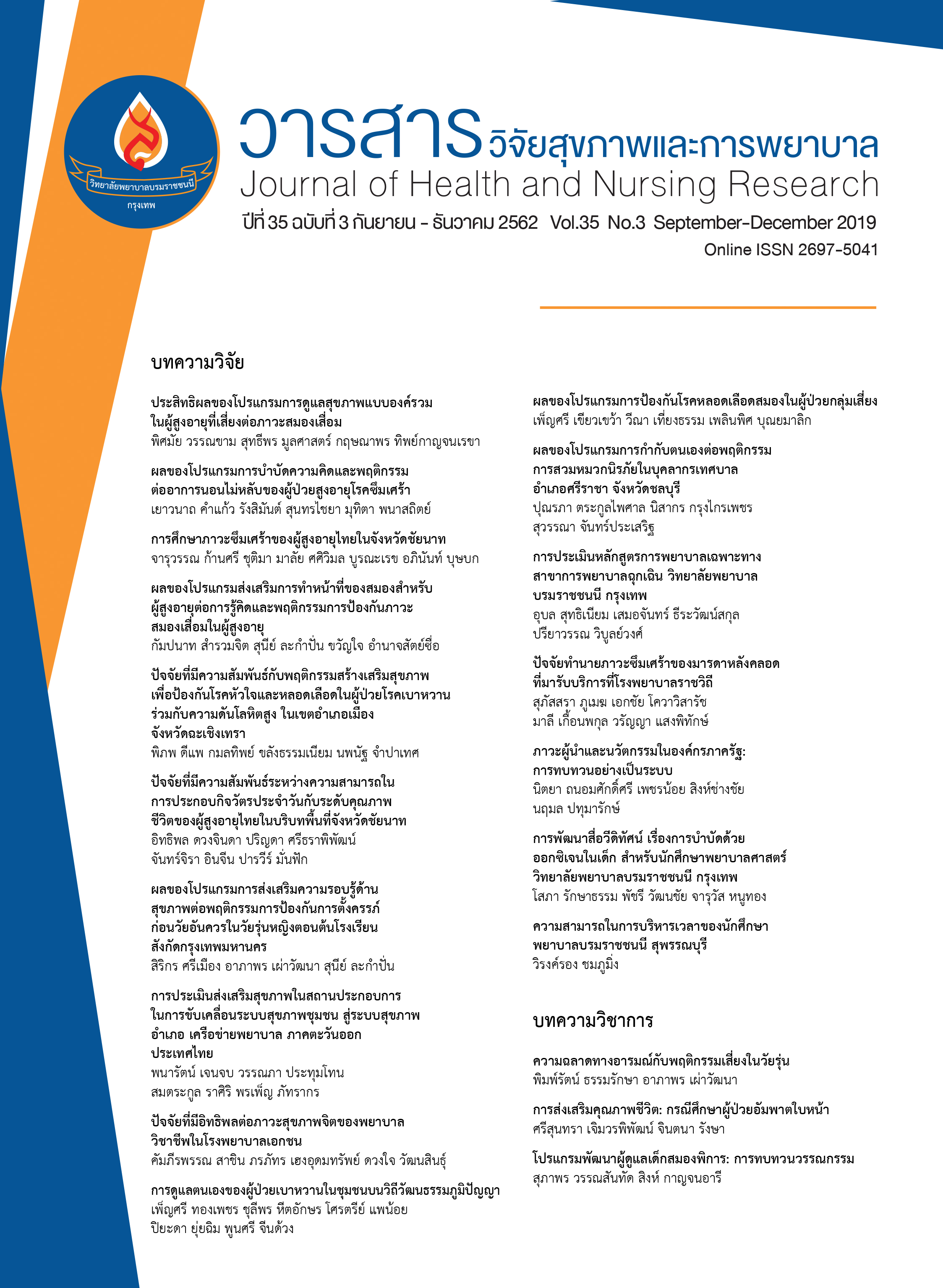ประสิทธิผลของโปรแกรมการดูแลสุขภาพแบบองค์รวมในผู้สูงอายุ ที่เสี่ยงต่อภาวะสมองเสื่อม
คำสำคัญ:
โปรแกรมการดูแลสุขภาพแบบองค์รวม, ภาวะสมองเสื่อม, ผู้สูงอายุบทคัดย่อ
การศึกษานี้เป็นการวิจัยกึ่งทดลอง แบบสองกลุ่มวัดผลก่อนและหลังการทดลอง มีวัตถุประสงค์เพื่อศึกษาผลของโปรแกรมการดูแลสุขภาพแบบองค์รวมต่อภาวะสมองเสื่อม ภาวะสุขภาพ และการสนับสนุนทางสังคมในผู้สูงอายุที่เสี่ยงต่อภาวะสมองเสื่อม กลุ่มตัวอย่างเป็นผู้สูงอายุที่เสี่ยงต่อภาวะสมองเสื่อมในอำเภอ กุดจับ จังหวัดอุดรธานี จำนวน 50 คน กำหนดขนาดตัวอย่างโดยใช้โปรแกรมคอมพิวเตอร์สำเร็จรูป G*Power 3.1 สุ่มตัวอย่างแบบง่าย ตามคุณสมบัติที่กำหนดเป็นกลุ่มทดลองและกลุ่มเปรียบเทียบกลุ่มละ 25 คน รวมจำนวน 50 คน เครื่องมือวิจัย ประกอบด้วย 1) โปรแกรมการดูแลสุขภาพแบบองค์รวม ซึ่งพัฒนาขึ้นตามแนวคิดตามแบบจำลอง กาย-จิต-สังคม มีระยะเวลา 8 สัปดาห์ กิจกรรมประกอบด้วย (1) การอบรมเชิงปฏิบัติการ การบรรยายให้ความรู้ กิจกรรมกลุ่มฝึกทักษะการบริหารสมอง ฝึกสมาธิและทักษะการเต้นบาสโลป (2) กิจกรรมการเยี่ยมบ้านผู้สูงอายุและแกนนำสุขภาพครอบครัว โดยพยาบาลเวชปฏิบัติร่วมกับอาสาสมัครดูแลผู้สูงอายุ 2) คู่มือการดูแลสุขภาพแบบองค์รวมเพื่อป้องกันภาวะสมองเสื่อม 3) สมุดแบบฝึกหัดบริหารสมอง 4) แบบสอบถาม มีค่าดัชนีความตรงเชิงเนื้อหาของภาวะสุขภาพและการสนับสนุนทางสังคม เท่ากับ .96 และ 1 มีค่าสัมประสิทธิ์แอลฟาของครอนบราค เท่ากับ .77 และ .76 5) แบบทดสอบสภาพสมองเบื้องต้นฉบับภาษาไทย (MMSE-Thai 2002) มีค่าดัชนีความตรงเชิงเนื้อหา เท่ากับ .96 มีค่าสัมประสิทธิ์แอลฟาของครอน บราค เท่ากับ .70 วิเคราะห์ข้อมูลโดยใช้สถิติเชิงพรรณนาและสถิติ independent t-test
ผลการวิจัยพบว่า หลังการเข้าร่วมโปรแกรมการดูแลสุขภาพแบบองค์รวม ผู้สูงอายุที่เสี่ยงต่อภาวะสมองเสื่อมในกลุ่มทดลองมีภาวะสมองเสื่อม ภาวะสุขภาพ และการสนับสนุนทางสังคม ดีกว่าก่อนเข้าร่วมโปรแกรมและดีกว่ากลุ่มเปรียบเทียบอย่างมีนัยสำคัญทางสถิติที่ระดับ .05
Downloads
เอกสารอ้างอิง
2. Bureau of Mental Health Promotion and Development, Department of Mental Health, Ministry of Public Health. Instructor's Guide 5 Dimensional Happiness Activities for Seniors in Nonthaburi Community: Office Printing National Buddhism; 2017. (in Thai).
3. Wiphan P. "Overview of Thai seniors" in reviewing and synthesizing knowledge Thai elderly 2002-2007. Bangkok: Foundation for Research and Development Institute Thai Elderly (M.Sc.); 2009. (in Thai).
4. Wikipedia. Dementia. Available from https://en.wikipedia.org/wiki/Dementia/dementia_2012041;2015.
5. Napas K, Benjaporn S. Integrated Elderly Health Care, Bangkok: Veterans Organization Publishing House under Royal Patronage; 2011. (in Thai).
6. World Health Organization. Dementia cases set to triple by 2050 but still largely ignored. Retrieved from entre/news/releases/2012Nursing from http://www.who.int/media centre/news/releases/2012/dementia_2012041 1/en/;2012.
7. Neurology Institute, Department of Medical Services, Ministry of Public Health. Guidelines for brain practice Decay. Bangkok: Thanaphan; 2014
8. Thai Elderly Research and Development Institute Foundation (PSU). The situation of Thai elderly in 2014. [Internet] [Quote on January 18, 2016]. Available From: http://www.thaigri.org/;2014.
9. Phawute M., Surin S. Thailand Journal of the Psychiatric Association of Thailand. 2010: (2)101-110 (in Thai).
10. Artitaya S, Sutthisi T. The effect of the cognitive stimulation program cognitive ability And the ability to do daily activities In the elderly risk or alzheimer's disease. Journal of the Thai Red Cross Society 2015.9(2):45-58. (in Thai).
11. Whanlaw N. Alzheimer's disease: The most common dementia in the elderly and trends disease situation in Thailand. Available from http://www.bangkokhealth.com.; 2012.
12. Spector A, Orrell M, Using a biopsychosocial model of dementia as a tool to guide clinical practice International Psychogeriatric 2010; 22:6:957–65.
13. Sutthisi T, Artitaya S, Effects of a cognitive stimulation program on the cognitive abilities and ability to perform the activities of daily living in elders who are at risk of or have dementia. Thai Red Cross Nursing Journal 2016;9(2):145-58. (in Thai).
14. Goldberg DP. The detection of psychiatric illness by questionnaire. Maudsley Monograph No 21. London: Oxford University Press, 1972
15. House JS. Work stress and social support. Reading, MA: Addison- Wesley. 1981.
16. Rachanee N. Rehabilitation of elders with dementia. Journal of Academic Affairs 2010;14(27):137-50. (in Thai).
17. Lutfi S, Plernpit T, Wipawee K. The results of the Montessori philosophy training program based on the Muslim way of life on the enrichment of cognition in elderly Muslims with dementia risk groups. Princess of Naradhiwas University Journal, 2016.8(2):16 -27. (in Thai).
18. Kalaya P, Rawiwan N, Khamkaew K. The efficacy of memory training using motessori philosophy– based activities in mild dementia elderly. Journal of the Psychiatric Association of Thailand 2009;54(2):197 -201. (in Thai).
19. Spector A, Orrell M, Aguirre P, Hoare R, Woods B, Streater AE, et al. Maintenance cognitive stimulation therapy for dementia: single-blind, multicentre, pragmatic randomized controlled trial. Br J Psychiatry 2014;204(6):454-61.
20. Sorutra H, Weena T, Sutham N. The results of the promotion program Elderly health at risk of dementia in the community by participation of Family. Journal of Public Health Nursing 2017;31(1):110-28. (In Thai).
21. Jaroonsak P. The development of baslop dancing and line dancing exercise program on blood pressure cardiorespiratory endurance system and balance of elderly persons in the elderly society of nongkhai manicipality. Science, Khon Kaen University 2018;41(1):101-17. (in Thai).
22. Schaefe C, Coyne JC, Lazarus RS. The health-related functions of social support. Journal of Behavioral Medicine 1981;4(4):381-405.
ดาวน์โหลด
เผยแพร่แล้ว
รูปแบบการอ้างอิง
ฉบับ
ประเภทบทความ
สัญญาอนุญาต
บทความที่ได้รับการตีพิมพ์ เป็นลิขสิทธิ์ของวารสารวิจัยสุขภาพและการพยาบาล (วิทยาลัยพยาบาลบรมราชชนนี กรุงเทพ) ไม่สามารถนำไปตีพิมพ์ซ้ำในวารสารฉบับอื่น


















